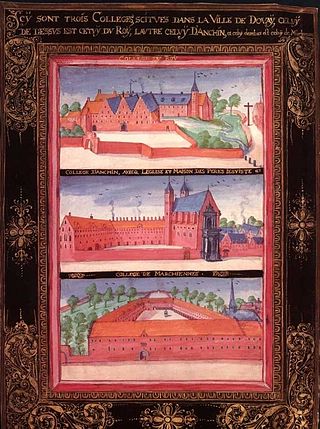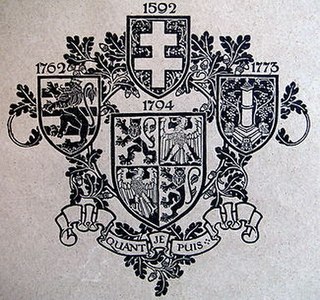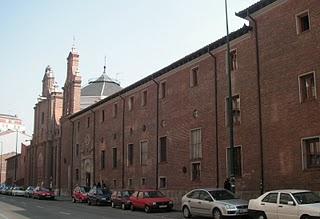Related Research Articles

Robert Persons, later known as Robert Parsons, was an English Jesuit priest. He was a major figure in establishing the 16th-century "English Mission" of the Society of Jesus.

William Allen, also known as Guilielmus Alanus or Gulielmus Alanus, was an English Cardinal of the Roman Catholic Church. He was an ordained priest, but was never a bishop. His main role was setting up colleges to train English missionary priests with the mission of returning secretly to England to keep Roman Catholicism alive there. Allen assisted in the planning of the Spanish Armada's attempted invasion of England in 1588. It failed badly, but if it had succeeded he would probably have been made Archbishop of Canterbury and Lord Chancellor. The Douai-Rheims Bible, a complete translation into English from Latin, was printed under Allen's orders. His activities were part of the Counter Reformation, but they led to an intense response in England and in Ireland. He advised and recommended Pope Pius V to pronounce Elizabeth I deposed. After the Pope declared her excommunicated and deposed, Elizabeth intensified the persecution of her Roman Catholic religious opponents.

Thomas Garnet, SJ was a Jesuit priest who was executed in London during the English Reformation. He is the protomartyr of Saint Omer and of Stonyhurst College. He was executed at Tyburn and is one of the Forty Martyrs of England and Wales.
Mark Barkworth, OSB was a Catholic priest, oblate of the Order of St Benedict, and martyr.
Seminary priests were Catholic priests trained in English seminaries or houses of study on the European continent after the introduction of laws forbidding Catholicism in Britain. Such seminaries included that at Douay, from 1568, and others at Rome from 1579, Valladolid from 1589, Seville from 1592, St Omer from 1593, and Lisbon from 1628. The English College at Douai was transferred to Rheims during the years 1578–1593.

The University of Douai was a historic university in Douai, France. With a medieval tradition of scholarly activity in the city, the university was established in 1559, and lectures began in 1562. It ceased operations from 1795 to 1808. In 1887, it was relocated 27 km away to Lille, where it became the University of Lille.
The English College was a Catholic seminary in Douai, France, associated with the University of Douai. It was established in 1568, and was suppressed in 1793. It is known for a Bible translation referred to as the Douay–Rheims Bible. Of over 300 British priests who studied at the English College, about one-third were executed after returning home.

The Catholic Church in England and Wales is part of the worldwide Catholic Church in full communion with the Holy See. Its origins date from the 6th century, when Pope Gregory I through a Roman missionary and Benedictine monk, Augustine, later Augustine of Canterbury, intensified the evangelization of the Kingdom of Kent, linking it to the Holy See in 597 AD.
The Venerable English College, commonly referred to as the English College, is a Catholic seminary in Rome, Italy, for the training of priests for England and Wales. It was founded in 1579 by William Allen on the model of the English College, Douai.
The Archpriest Controversy was the debate which followed the appointment of an archpriest by Pope Clement VIII to oversee the efforts of the Roman Catholic Church's missionary priests in England at the end of the sixteenth century.
Joseph Creswell was an English Jesuit controversialist.

The Colleges of St Omer, Bruges and Liège were successive expatriate institutions for Roman Catholic higher education run by the Jesuits for English students.

William Weston, SJ was an English Jesuit missionary priest. He was appointed superior of the Jesuits on the English Mission.

The Royal English College is a Catholic Seminary located in Valladolid, Spain, for the training of priests in England and Wales. It is under the patronage of St Alban.
The English College, Lisbon was a Roman Catholic seminary that existed from the 17th century to the 20th century.
The Wisbech Stirs was a divisive quarrel between English Roman Catholic clergy held prisoner in Wisbech Castle in the Isle of Ely, Cambridgeshire, towards the end of the reign of Elizabeth I of England. It set some of the secular clergy against the regular clergy represented by the Society of Jesus, the religious institute that was emerging as clerical leaders, and who wished for a more ordered communal life in the prison.
Owen Lewis, also known as Lewis Owen was a Welsh Roman Catholic priest, jurist, administrator and diplomat, who became Bishop of Cassano all'Jonio.
William Crichton or Creighton was a Scottish Jesuit who became head of the Scots seminary in Flanders.

The Irish College at Salamanca,, was endowed by the King of Spain and dedicated as the St Patrick's Royal College for Irish Noblemen. It was founded by Thomas White, formerly of Clonmel, Ireland, in 1592 to house the students of that country who came to Salamanca to escape the religious persecution of the Catholic Church in Ireland. The students resided at the college while attending lectures at the University of Salamanca.
English College may refer to:
References
- ↑ A Memoriall for the Reformation of England conteyning certayne notes and advertisements which seeme might be proposed in the first parliament and nationall councell of our country after God of his mercie shall restore it to the catholique faith [...]; gathered and set downe by R. P., 1596. Houliston, Victor. "Persons, Robert". Oxford Dictionary of National Biography (online ed.). Oxford University Press. doi:10.1093/ref:odnb/21474.(Subscription or UK public library membership required.)
- ↑ Bergin, J. Smith, Richard (1567–1655), vicar apostolic of the English church. Oxford Dictionary of National Biography. Retrieved 10 Dec. 2021 (subscription or membership of a UK public library required)
- ↑ Martin Murphy, St Gregory's College, Seville 1592-1767, Catholic Record Society, 1992